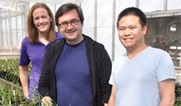
MANHATTAN, KANSAS, U.S. — Scientists at Kansas State University (KSU) have released findings from a two-year study on the genomic diversity of wheat. The findings may prove useful in shortening the release times of future wheat varieties.
The scientists produced a haplotype map of wheat that describes genetic differences in a worldwide sample of wheat lines. A haplotype map is used in transferring sequence-level variation to multiple gene mapping projects.
“All of these new, genomic-based strategies of breeding promise to significantly accelerate breeding cycles and shorten release time of future wheat varieties,” said Eduard Akhunov, associate professor of plant pathology at KSU and leader of the project.
The genetic makeup is used to breed new wheat varieties for specific traits, such as resistance to drought, pests or diseases. The haplotype map gives scientists quick access to genetic variation data, which increases the precision of mapping genes in the wheat genome, Akhunov said.
The study included 62 wheat lines from around the world that were either modern cultivars or varieties not previously improved through formal breeding techniques. The scientists found 1.6 million locations in the genome where wheat lines differed from one another. The information was used to describe the impact of the differences on the function of tens of thousands of wheat genes.
“Once genes controlling agronomic traits are identified, they can be used for improving wheat using not only traditional breeding approaches but also new strategies that are based on biotechnology and molecular biology,” Akhunov said.
The study should appear in a future issue of the journal Genome Biology. The project was coordinated through the International Wheat Genome Sequencing Consortium, and it included groups in Canada, Australia, the United Kingdom and the United States. The U.S. Department of Agriculture’s National Institute of Food and Agriculture provided funding for the study.
Source: World Grain
MAR
2015


About the Author: